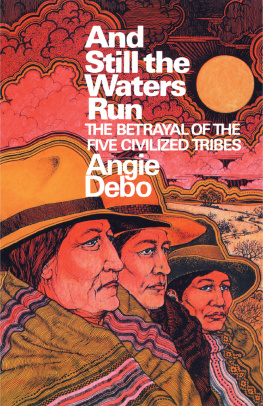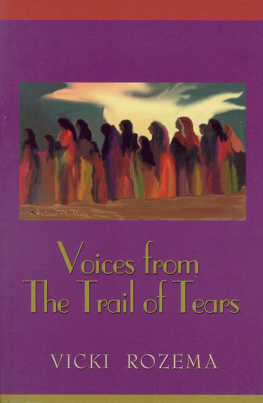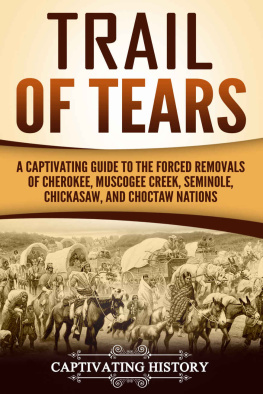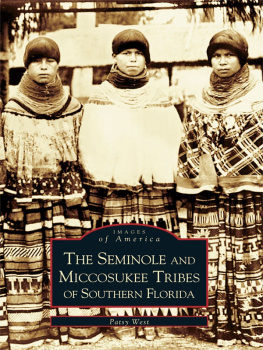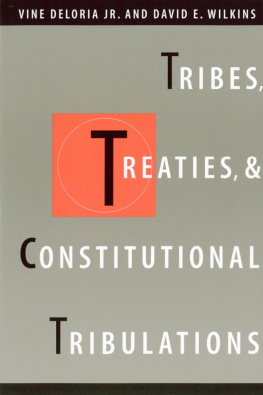AND STILL THE WATERS RUN

Published by Princeton University Press, 41 William Street,
Princeton, New Jersey 08540
Copyright 1940 by Princeton University Press
Copyright renewed 1968 by Princeton University Press
All Rights Reserved
Library of Congress Card No. 72-6098
ISBN 0-691-04615-8 (hardcover edition)
ISBN 0-691-00578-8 (paperback edition)
eISBN: 978-0-691-20931-9 (eBook)
R0
TO MY PARENTS
EDWARD P. AND LINA DEBO
WHOSE CONSTANT INTEREST IN THIS BOOK
AND WHOSE PATIENCE AND FORBEARANCE DURING ITS PROGRESS
HAVE LIGHTENED THE LABORS OF AUTHORSHIP
CONTENTS
ix
Chapter
| 3 |
| 31 |
| 61 |
| 92 |
| 126 |
| 159 |
| 181 |
| 203 |
| 230 |
| 258 |
| 291 |
| 318 |
| 351 |
| 379 |
MAPS
opposite page 181
opposite page 286
ILLUSTRATIONS
PREFACE
E VERY schoolboy knows that from the settlement of Jamestown to the 1870s Indian warfare was a perpetual accompaniment of American pioneering, but the second stage in dispossessing the Indians is not so generally and romantically known. The age of military conquest was succeeded by the age of economic absorption, when the long rifle of the frontiersman was displaced by the legislative enactment and court decree of the legal exploiter, and the lease, mortgage, and deed of the land shark. As a preliminary to this process the Indians were persuaded or forced to surrender their tribal organization and accept United States citizenship and to divide their communal holdings into individual allotments.
Because of the magnitude of the plunder and the rapidity of the spoliation the most spectacular development of this policy occurred with the Five Civilized Tribes of the Indian Territory. At the beginning of the present century about seventy thousand of these Indians owned the eastern half of the area that now constitutes the state of Oklahoma, a territory immensely wealthy in farmland and forest and coal mines, and with untapped oil pools of incalculable value. They ruled themselves and controlled this tribal property under constitutional governments of their own choosing, and they had attained a degree of civilization that made them at once the boast of the Indian Office and living examples of the benefits of travelling in the white mans road. Their political and economic tenure was guaranteed by treaties and patents from the Federal Government, and warned by the tragic fate of all Indians who had lost their homes, they insisted upon the observance of these conditions. But white people began to settle among them, and by 1890 these immigrants were overwhelmingly in the majority. Congress therefore abrogated the treaties, and the Indians received their land under individual tenure and became citizens of Oklahoma when it was admitted to the Union in 1907.
The orgy of exploitation that resulted is almost beyond belief. Within a generation these Indians, who had owned and governed a region greater in area and potential wealth than many an American state, were almost stripped of their holdings, and were rescued from starvation only through public charity. Such treatment of an independent people by a great imperial power would have aroused international condemnation; but these Indian republics wereto quote John Marshalls famous opiniondomestic dependent nations, and the destruction of their autonomy was a matter of internal policy. Even as a real estate transaction this transfer of property would have attracted wide attention, but the Indians had been forced to accept the perilous gift of American citizenship and they were despoiled individually under the forms of existing law; hence no writer of American history devotes even a sentence to their wrongs, students of Indian life are interested only in their inspiring achievements under the tribal rgime, and their plight during the generation of their exploitation has been consistently ignored by the press.
Obviously the rapidity of the spoliation called for crude methods, in many cases even criminal methods, and the immense value of the loot exerted a powerful influence upon contemporary opinion and standards of conduct. It should not be necessary to point out that Oklahomans are no worse than their neighbors, for this is only one episodealthough the most dramatic episodein a process that constitutes an unrecorded chapter in the history of every American frontier. But the reaction of this process upon the ideals and standards of successive frontier communities is a factor in the formation of the American character that should no longer be disregarded by students of social institutions.
Fortunately the historian is not expected to prescribe remedies. The policy of the United States in liquidating the institutions of the Five Tribes was a gigantic blunder that ended a hopeful experiment in Indian development, destroyed a unique civilization, and degraded thousands of individuals. As the story unfolds, the reader may formulate policies that might have averted this disaster if adopted, or he may conclude that the catastrophe was inevitable.
This study was undertaken before the election of 1932, and if its findings support the tenets of the present Indian administration the circumstance is accidental. The research was carried on independently and with no preconceived theories of Indian policy. The facts uncovered during the investigation were a revelation to the writer, who had grown up in Oklahoma without knowing that these things were so.
The manuscript was completed in 1936 only a few days after the passage of the Oklahoma Indian Welfare Act; but publication has been delayed and it has been decided to include some new material to bring the subject up to date as far as possible. This portion of the research has been necessarily superficial, for it is too early to reach conclusions as to the effect of such a radical change in Indian policy. It is believed, however, that the revision will be a convenience to the reader in the relatively unimportant matter of statistical information.
The author is under obligations to Dr. E. E. Dale, head of the history department of the University of Oklahoma, for awakening in student days an interest in Indian institutions; to Mr. Frank Phillips of Bartlesville, whose public spirit in establishing a collection of historical material at the University has provided facilities for research; to Mrs. Mabel Bassett, Commissioner of Charities and Corrections of the State of Oklahoma, for free access to her files; to Miss Margaret Camp of Albuquerque, New Mexico, for secretarial help that amounted to collaboration; to Commissioner John Collier and the employees of the Indian Office at Washington and in Oklahoma for unlimited access to current files and the opportunity of observing the work of the field service; to the librarians and archivists at the University of Oklahoma and the Oklahoma State Historical Society; and above all to the Social Science Research Council for a grant-in-aid without which the research could not have been completed.
ANGIE DEBO
Marshall, Oklahoma
May 28, 1940
THIRTY-TWO YEARS AFTER
I welcome the opportunity provided by the reissue of this book to clarify one expression I used unthinkingly in the original edition. The term restricted Indian had passed into common speech as a convenient designation for the owner of restricted land, and I used it without realizing that it was subject to misinterpretation. Actually there is no such thing as a restricted Indian. Only the land obtained from the tribe carries this protection against alienation; and the ownership of restricted land no more restricts an Indians personal freedom than does the ownership of trust property or tax-free bonds by any other citizen. This distinction is important in view of the slogans of exploiters who would set the Indians free. I regret that I have blurred it by my loose terminology.

